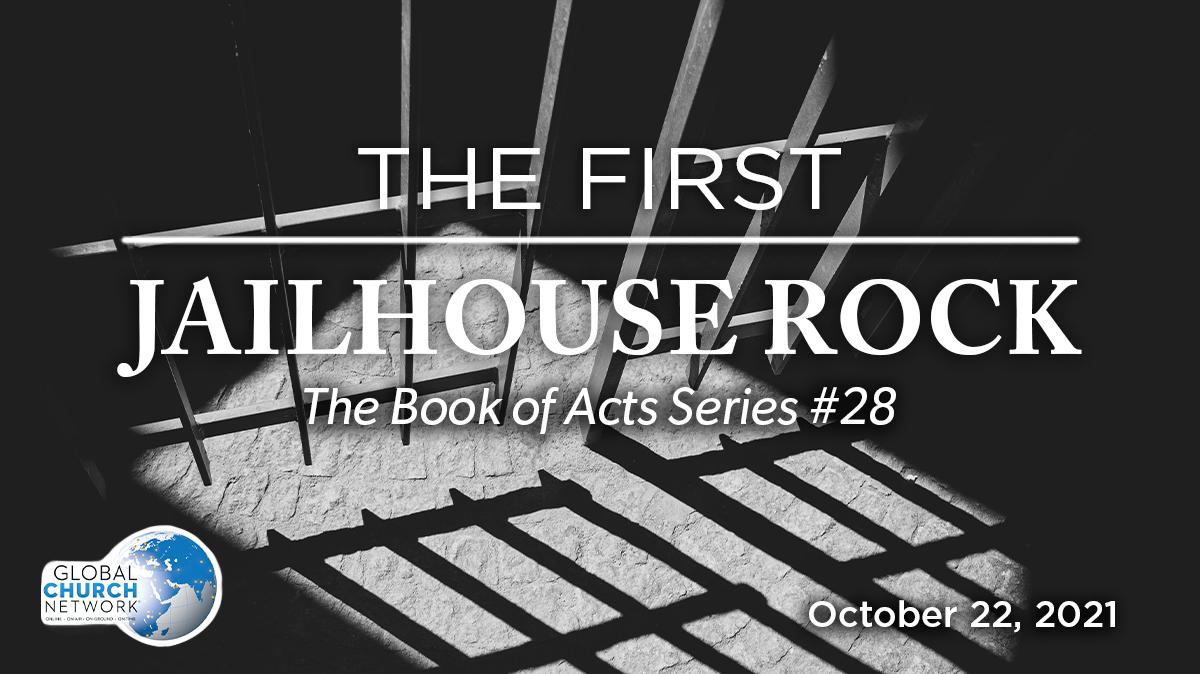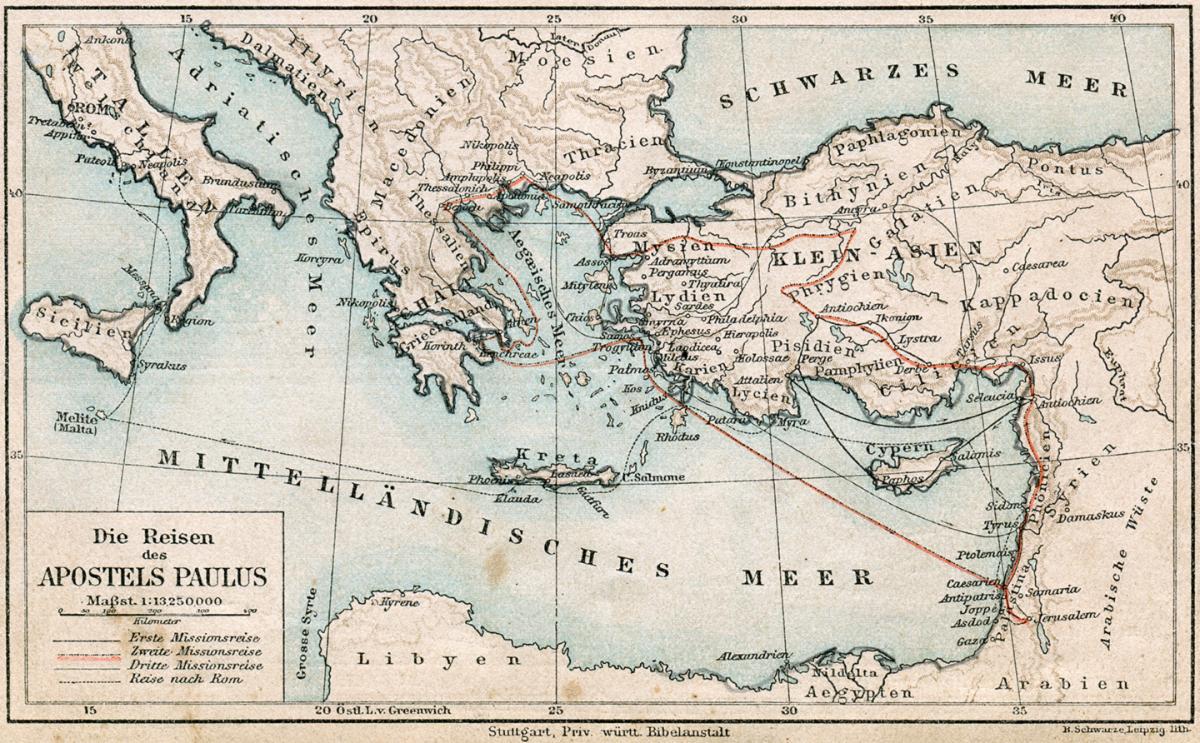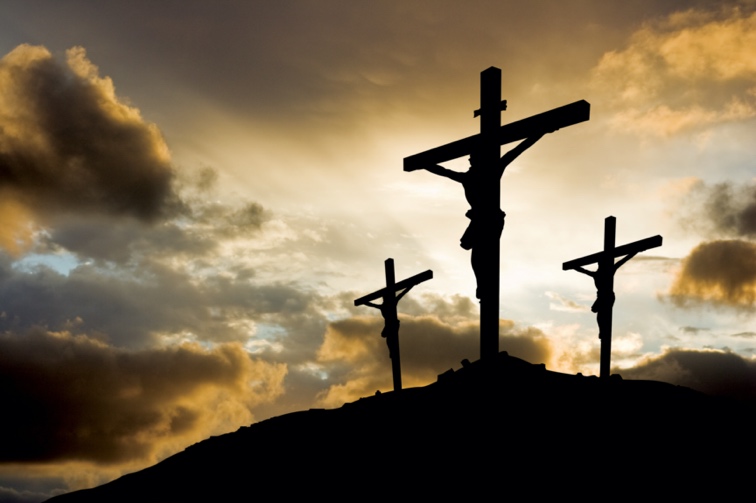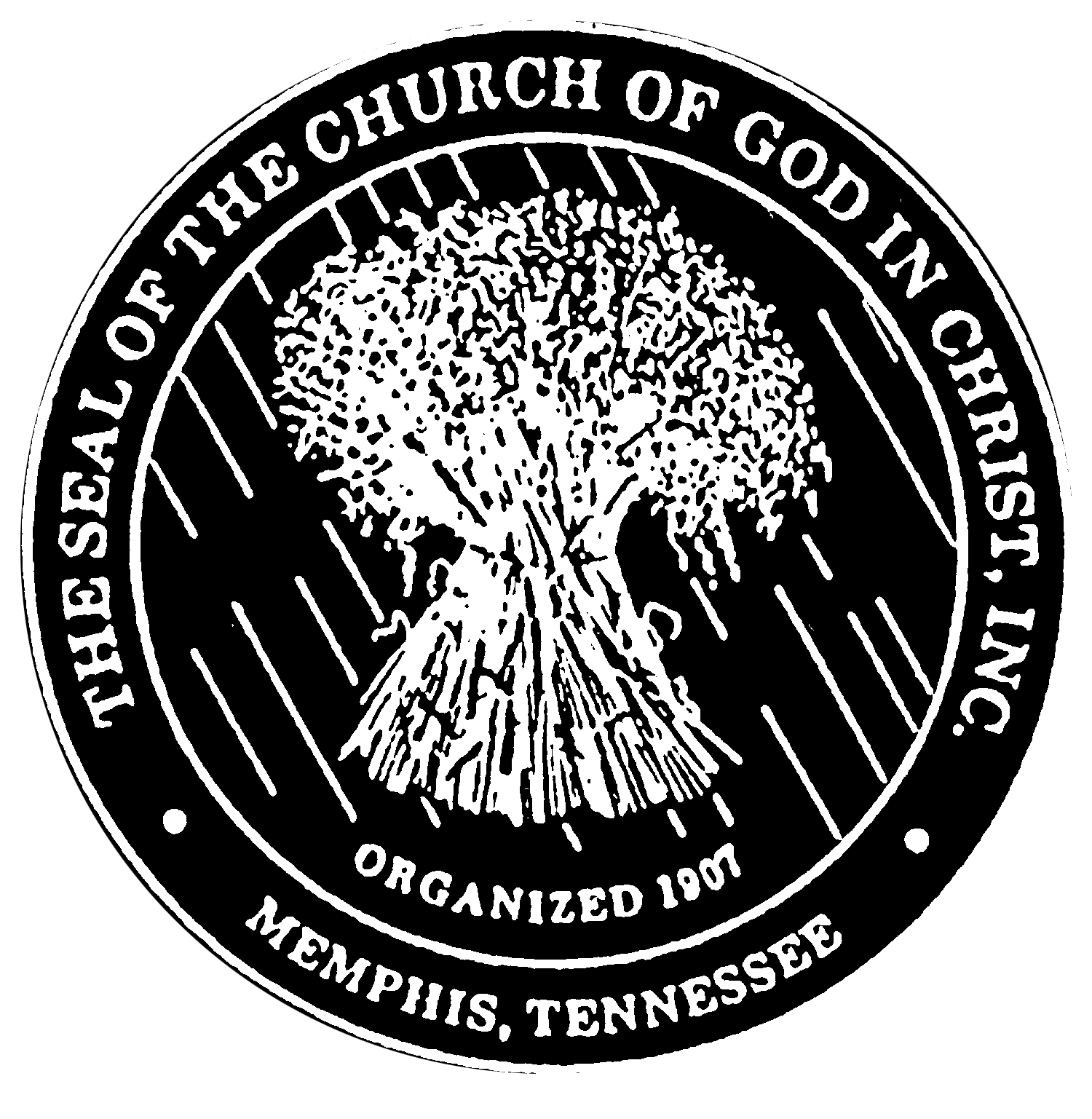The First Jailhouse Rock: Acts Series #28

Everywhere Paul went, there was either a riot or a revival. He either made friends for Christ or foes for Christ. Upon coming to town, Paul did not stay in a penthouse, but often a jailhouse.
 In Acts chapter 16, there are many conquests. Paul is now beginning his ministry in Europe; that would eventually spread to America. These conquests commenced with vagueness; not knowing which way to go (16:6-8), continued with vision (16:9-11) and climaxed with victory (16:12-40).
In Acts chapter 16, there are many conquests. Paul is now beginning his ministry in Europe; that would eventually spread to America. These conquests commenced with vagueness; not knowing which way to go (16:6-8), continued with vision (16:9-11) and climaxed with victory (16:12-40).
Second, chapter 16 is filled with conversions. Lydia found the Lord (16:14-15). A slave found the Savior (16:16-18). A jailer found Jesus (16:30-31). Luke shows us how the Holy Spirit dealt with a tender soul, a tormented soul and a tough soul. Each conversion was different. For Lydia, it was a heartwarming. For the slave, it was devil-defying. For the jailer, it was earth-shaking. Lydia was a seller of purple and wealthy. The was a slave to people and wretched. The jailer was supervisor of prisoners and worldly.
Next. Acts chapter 16 is filled with cities. Derbe, Lystra, Iconium, Phrygia, Mysia, Bithynia, Troas, Samothracia, Neapolis, Philippi, and Thyatira. Philippi was a capital city. It was ten miles inland from Neapolis. The city crowned a steep hill that was encircled by two rivers. The came from Philip of Maredon (father of Alexander the Great), who had wanted the nearby gold mines. The Romans divided Macedonia into four administrative districts. Luke literally describes Philippi as “a city of the first district of Macedonia.”
Also, Philippi was a colonial city. Rome ruled the world through her colonies. Rome founded settlements and citizens would set up outposts for the empire. The Roman way of life was promoted. These colonies gave loyal bases abroad and secure locations for the military. Later, Paul wrote to the church at Philippi and said, “For our citizenship is in heaven.” This is a magnificent concept of the role of the Christian in this hostile world. We are here to represent a way of life and to represent an empire not of this world.
Philippi was a carnal city. Traditionally, Paul would first go to a synagogue. But, in Philippi, there was no synagogue. The Jewish rule was that it required ten men before a synagogue could be established, and no amount of women could make up the difference of men lacking.
So, Philippi was capital city, a colonial city, a carnal city, and soon to be a converted city. Paul has come to Philippi with Macedonia on his mind, a mission in his hear, and a message on his lips.
I. We Need To Realize The Scheme Of Satan
(Acts 16:16-24)
When God begins to do a work, Satan battles to destroy it. Here, Luke uncovers Satan’s scheme for us.
Possession
 First, Satan’s scheme included possession (Acts 16a-c). We read, “And it came to pass, as we went to prayer, a certain damsel possessed with a spirit of divination met us . . .” The girl was a slave physically as well as spiritually. Slavery was a major scourge in the Roman Empire and in the world of Paul’s day. Paul makes no effort to deal with the social problem, only with the spiritual problem. One must get right with God before he/she can get right with his/her fellow man.
First, Satan’s scheme included possession (Acts 16a-c). We read, “And it came to pass, as we went to prayer, a certain damsel possessed with a spirit of divination met us . . .” The girl was a slave physically as well as spiritually. Slavery was a major scourge in the Roman Empire and in the world of Paul’s day. Paul makes no effort to deal with the social problem, only with the spiritual problem. One must get right with God before he/she can get right with his/her fellow man.
The expression “a spirit of divination” is a literally a “spirit of python.” In other words, this demented girl was pythoness, under the control of the demon Apollo. The shrine, famous for the oracles associated with this god, was at Delphi (Pytho) in Central Greece. This slave girl was able to predict the future.
Prosperity
We read, “. . . which brought her masters much gain by soothsaying (Acts 16:16d).” Her masters found her gift highly profitable. People would flock to her to have their fortunes told. She was valuable piece of property. When you were a slave, you were owned by your maters. You were at your master’s mercy. This slave girl was exploited by her masters. Next, there was the devil’s.
Publicity
We read, “The same followed Paul and us, and cried, saying, ‘These men are the servants of the most high God, which show unto us the way of salvation. And this did she many days. But Paul, being grieved, turn and said to the Spirit, I command thee in the name of Jesus Christ to come out to her. And he came out the same hour (Acts 16:17-18).”
Salvation was a popular topic of conversation in those days. It meant different things to different people. Therefore, it is not strange that this demonic spirit said that these missionaries were showing “the way of salvation.” However, we must ask, “Why should a demon engage in evangelism?” It was to water down Paul’s message and to discredit the Gospel by associating it in the people’s minds with the occult. In the Gospels, Jesus Christ never appreciated nor accepted the testimony of demons. He had come to destroy the work of the devil. Testimony from demon possessed people was an affront to the Lord. Jesus consistently silenced evil spirits who bore him involuntary witness.
Paul did not want Satanic testimony either. It was true that Paul and Silas were servants of the most high God, and proclaimed the way of salvation. However, it was the work of the Holy Spirit, not an evil spirit, to bear witness of that. Evils spirits lie, deceive, and their testimony is tainted with falsehoods. Their business with mankind is to blind and bind.
At first, Paul hesitated to do anything about this slave girl. The girl was not for sale because she was a valuable piece of property. Paul was pragmatic enough to know he would be asking for trouble to free this girl from her demon possession. She was legally someone else’s property. But, Paul was grieved for the damage being done to the cause of Christ. He was grieved for this poor, lost, demon-possessed slave girl. At last, Paul could not hold back no longer. The girl was set free from a spiritual captivity worse than any slavery devised by Rome. She was saved!
Now, Paul’s response would not be popular today. For we are living in a time when preachers will do anything to promote their meetings and ministry. Presently, the Church allows Hollywood stars who have the faces of angels and the morals of alley casts to promote its causes and endorse them. However, Jesus Christ does not need any endorsements. The Church does not need the encouragement of the devil’s crowd to win the lost.
Persecution
There was several levels to this persecution. First Paul and Silas were captured. We read, “And when her masters saw that the hope of their gains were gone, they caught Paul and Silas and drew them into the marketplace unto the rulers” (Acts 16:19).
 The deliverance for the salve girl was too much for her owners. They realized that since the evil spirit had gone out of her, their hope of making money was gone. When Paul exorcised the spirit that possessed her, he exorcised their source of income as well. Luke’s account of events, accurately reflect the situation in a Roman colony. The slave owners dragged Paul and Silas into the agora. This was the marketplace and the center of public life.
The deliverance for the salve girl was too much for her owners. They realized that since the evil spirit had gone out of her, their hope of making money was gone. When Paul exorcised the spirit that possessed her, he exorcised their source of income as well. Luke’s account of events, accurately reflect the situation in a Roman colony. The slave owners dragged Paul and Silas into the agora. This was the marketplace and the center of public life.
The reason why they laid hands on Paul and Silas and not on Luke and Timothy may have been partly because Paul and Silas were the leaders of the missionary party. But we should also remember that Paul and Silas would be the most Jewish in appearance. Luke was a Gentile and Timothy was half-Gentile.
Now, there are some businesses that ought to be destroyed. Businesses that trade on people’s vices, ponder to lust, undermine society, wreck home and marriages, ruin health and spread disease, ought to be eliminated. There are thousands of people who liquorize society, popularize sin, and glamorize sex. There is big money to be made in these things. But, we need the power of God to break these evils.
But woe to those who try to stop these evils. When a person’s pocketbook is touch, he or she often becomes furious. The callous exploitation of the slave girl was profitable. Her emancipation spoiled the business plans of evil men. So, the girls’ owners were enraged. The two men responsible were Paul and Silas. Therefore, they were hauled off to the authorities.
Second, this persecution involved a charge (Acts 16:20-21). There was a three-fold charge laid against Paul and Silas. A racist charge was brought against them (v.20a). We read, “And brought them to the magistrates saying, these men, being Jews . . .” Since Philippie was a Roman colony, its municipal administrators, like that of the city of Rome itself, was in the hands of two collegiate magistrates. The collegiate magistrates of a Roman colony were commonly called doomvirs, but sometimes they preferred the more dignified title of praetors. Before the two praetors, Paul and Silas were dragged to face their charges. The first charge was filled with racism. Their appeal was latent with anti-Semitism and racial pride. It ignited the flames of bigotry and prevented any dispassionate discussion of the issues. There was nothing wrong with Paul and Silas being Jews for the Roman Law protected them. However, it was a racial charge well calculated to prejudice a air trail in Philippi.
Additionally, this charge included riot charge (v. 20b). Our text states, “These men, being Jews, do exceedingly trouble in our city.” The seriousness of the charge that the two wandering Jews were making trouble in the city is about to be seen. Roman colonies were supposed to be models of peace and decorum, and to disturb the peace would be a reflection on Rome itself. The Magistrates would see any such riot as a reflection on themselves. The expression “do exceedingly trouble” occurs only here in the New Testament and suggests that a riot was feared.
Last, but not least there was a religious charge (v.21). We read, “And teach customs, which are not lawful for us to receive, neither to observe, being Romans.” The accusations of causing a riot and introducing an alien religion were serious. A Roman citizen could not practice any alien cult that had not received the public sanction of the state. Customarily, he might do so as long as his cult did not otherwise offend against the laws and usages of Roman life. These slave owners were very clever. They concealed the real reasons for the anger, which were economic.
As we continue along through chapter 16, we now return to the next level of persecution. We have already seen how Paul and Silas were caught and charged, but now they were condemned (Acts 16:22). They were condemned by the people. We read, “And the multitude rose up together against them; and the magistrates rent off their clothes and commanded to beat them.”
The magistrates were easily swayed. The two prisoners were stripped. Then the lictors were summoned. In Roman cities the lictors carried a bundle of rods tied together around an axe. Rods and an axe symbolize corporal punishment and the death sentence.
Not only were they condemned by the people, but through pain (Acts 16:23). We read, “And when they had laid many stripes upon them, they cat them into prison, charging the jailer to keep them safely.” Paul and Silas were beat unmercifully. Their backs were soon a bloody mass, and they were so weak that they could hardly stand up.
Furthermore, they were condemned in the prison (Acts 16:24). We read, “Who, having received such a charge, thrust them into the inner prison, and made their feet fast in the stocks.” The jailer put Paul and Silas in the maximum security ward. The thrust their feet into the stocks and made sure the stocks were locked. These men were left to suffer through the night. The jailer was a retired army veteran who could be expected to follow orders.
The jail was not like today’s prisons. It was nothing more than a hole in the ground. The jail was totally dark. It was damp, dark, dungeon filled with rates. There was a stench that made it almost impossible to breathe. Also, it was a crowded, cramped place. Paul and Silas were put in stocks. Their legs stretched to the pace of pulling their hips out of joint. These men were experiencing terrible times and troubles. And just because you are committed to Christ, it does not mean you will not face difficulties in your life.
II. We Need To Remember The Song Of The Saints
(Acts 16:25-26)
We are about to witness the first jailhouse rock. We will see how God intervened in the midst of a praise and worship service.
The Midnight Exaltation (v.25)
There were three actions involved in this praise and worship service. We notice praying (“And at midnight Paul and Silas prayed. . .”), praising (. . . and sang praises to God . . .”) and preaching (“and the prisoners heard them.”). Paul and Silas are locked up in prison in the inner ward. Their feet and hands are fastened. Their future is uncertain.
 We can picture the scene. Silas might have said, “Brother Paul, how’s your back?” How’s yours, Silas?, answered Paul. Mine hurts. Your legs cramped yet?” They hurt abominably, Paul. I am glad Timothy and Luke escaped. We sure could use a little of Doctor Luke’s balm on our backs right now.”
We can picture the scene. Silas might have said, “Brother Paul, how’s your back?” How’s yours, Silas?, answered Paul. Mine hurts. Your legs cramped yet?” They hurt abominably, Paul. I am glad Timothy and Luke escaped. We sure could use a little of Doctor Luke’s balm on our backs right now.”
What are we going to do Paul? Will they beat us again? What are we going to do?” First, we are going to pray. That will take care of tomorrow. Then, we are going to sing.”
Sing? Yes, Sing!”
So, they sang and the whole provision heard them. Paul and Silas turned the jailhouse into a church house. It happened at midnight. Midnight represented the darkest part of the night.
Have you ever been to the midnight hour? Have you ever been to a time in your life when it could not get any darker? I have walked with people in the midnight hour. Do you have a song to sing in the midnight hour? I mean when things are dark in the hospital and there seems to be no hope. The doctor said that it will take miracle to recover. Friends have told you there is no hope. Have you a song to sing at midnight?
We have a Savior who can give us a song to sing in the midnight hour. The truth of Christianity is seen when you have a song during a dark time in your life. If you can sing in the midnight hour, then what you have is real.
And, the prisoners heard them singing. Can you imagine this. These prisoners were use to hearing people scream and blaspheme. Can you picture how it was when the prisoners heard the sweet strains of gospel songs? It is a tremendous testimony to the lost when we have a song in our heart at the midnight hour. They are looking and listening. There is a difference between happiness and joy. Happiness depends on what happens, and joy depends on Jesus. When Paul wrote to the Philippians, he said, “Rejoice and again I say rejoice.”
This is the first European sacred concert. Two preachers are singing artists. The concert hall was a jail. They sang with such power and excitement that they brought the house down. Their legs were in the stocks, but their hearts were in heaven!
The Mighty Earthquake (v. 26)
We read, “And suddenly there was a great earthquake, so that the foundations of the prison were shaken; and immediately all the doors were opened, and everyone’s bands were loosed.”
The prison walls echoed with hymns and songs of praise. The other prisoners heard the name of Jesus and the message of salvation. Do you know what happened? They were singing and the Lord heard them. He leaned over and tipped his ear to hear them sing. The Lord begin to enjoy this concert so much that He began to tap His foot to the singing. The walls and foundation of hat prison thought the millennium had come. They clapped their hands and stamped their feet and roared out their joy in an earthquake!
But what an earthquake! Walls did not cave in. The roof did not fall. Instead, prison doors burst open and chains fell off, and a hardened jailer was shaken out of his indifference. If we could learn to pray, praise and preach like Paul and Silas, then we would shake our cities for Christ.
III. We Need To Receive The Salvation Of The Sinner
(Acts 16:27-34)
 There can be no doubt that the jailer in Acts 16 has come to Jesus Christ. We need to believe our Lord to shake lost humanity locked up in the prisons of their souls and to break the strongholds that bind them!
There can be no doubt that the jailer in Acts 16 has come to Jesus Christ. We need to believe our Lord to shake lost humanity locked up in the prisons of their souls and to break the strongholds that bind them!
The Jailer’s Conclusion (v.27)
We read, “And the keeper of the prison awakened out of his sleep, and seeing the prison doors open, drew out his sword, and would have killed himself, supposing that the prisoners had fled.”
The earthquake that rocked the prison foundation awakened the jailer out of his midnight sleep. When he saw the doors open, he concluded that the prisoners had escaped. For a man brought up on a Roman’s solder’s ideas of duty and discipline, there was only one course open—suicide.
This jailer is experiencing a crisis in his life. And there are some people who will not get interested in Jesus until they have gone through a midnight crisis. I am convinced that the Paul witnessed to this jailer along the way. When the clamps were put on Paul’s wrists, he said, “All have sinned and come short of the glory of God.” The jailer said, “big deal.”
Then, when the shackles were put on Paul, he said, “For the wages of sin is death.” The jailer said, “So what.” Then, as Paul was placed in the stocks, he said, “God commended his love toward us while we were yet sinners, Christ died for us.” The jailer said, “I am not interested.” The Paul said, “yes, but if you would confess with your mouth the Lord Jesus and believe in thine heart that God hath raised Him from the grave, you shall be saved.” But, the jailer slams them in jail and goes to eat supper. And, he goes to bed earlier. He was not interested in their religion.
But when a crisis comes, people quickly become interested in God. For example, when that wife leaves for good, the husband will try to find someone who can pray. Or when someone loses his or her job, he or she becomes interested in spiritual things.
This jailer was not concerned about Christ, until a crisis came home to him. He thinks that all the prisoners are gone. So, while he could see nothing as he looked in the darkness, others could see the sword silhouetted in the doorway. The prisoners knew what he was about to do.
This jailer has come to the end. He knows of no way out of the problem. Maybe one is here today. Maybe you have come to the end of your rope. Maybe you have tried everything in the world to solve your problems. Jesus is the mender of broken hearts.
The Jailer’s Conviction (vv. 28-29)
We read, “But Paul cried with a loud voice, saying “Do thyself no harm: for we are all here. Then he called for a light, and sprang in, and come trembling, and fell down before Paul and Silas.”
This miracle comes in three parts. Paul and Silas are seen rejoicing in suffering. Every prisoner is released because of the earthquake. And every prisoner is restrained from running away. With a light in hand, he leaped into the prison. Some power greater than the jailer had kept all the prisoners there. Conviction and yearning filled his soul.
The Jailer’s Conversion (vv.30-32)
 The story continues with, “And brought them out, and said, sirs, what must I do to be saved? And they said, Believe on the Lord Jesus Christ, and you shall be saved, and thy house.”
The story continues with, “And brought them out, and said, sirs, what must I do to be saved? And they said, Believe on the Lord Jesus Christ, and you shall be saved, and thy house.”
The jailer asked the question of the ages. He wanted to know what he needed to do. Paul said, “believe.” It is not doing but believing that saves a person. He needed to believe in the Lord Jesus Christ. Lord indicates “master.” Jesus indicates “manhood.” Christ indicates “Messiah.”
The jailer wanted salvation for his heart and his household. He wanted his family saved even though it was in the middle of the night! There is an urgency in his heart. The Bible says, “And they spoke unto him the Word of the Lord, and to all that were in his house.”
The Jailer’s Compassion (v.33a)
We read, “And he took them in the same hour of the night and washed their stripes.” This was the first act of a converted man. Callousness had been changed to compassion. This tough jailer took a sponge and washed the prisoner’s wounds. This man is a converted man because he wanted to undo some things he had done. The jailer wanted to get everything straightened out in his life. He had been a heathen when the sun set. Now he was s Christian when the sun arose. He was no longer groping in the darkness, but now he walked in the light of Christ.
The Jailer’s Commitment (vv.33b-34)
Last, we read, of his baptism (“And was baptized, he and all his straightway”) and his belief (“And when he had brought them into this house, he set meat before them and rejoiced believing in god and all his house.”).
There is no one too difficult for Jesus to save. There is no problem to heard for God to solve. There is n night too dark that God cannot put a song in your heart. God can use our sufferings for soul winning. Our midnight can become a midday. God can turn the negatives into positives.




























